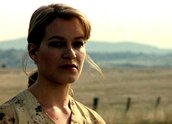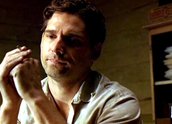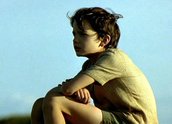


Romulus, My Father (2007)
Synopsis
Raimond Gaita (Kodi Smit-McPhee) lives with his father Romulus (Eric Bana) in a rundown farmhouse in central Victoria. It is 1960 and Raimond’s mother Christina (Franka Potente) returns for one of her infrequent visits. She leaves soon after and moves in with Mitru (Russell Dykstra), a family friend. She bears him a daughter, Susan, but is incapable of caring for the baby, and her relationship with Mitru becomes abusive. After Romulus is almost killed in a motorbike crash, Christina returns to live with the family, but her spirit is broken and she commits suicide. Romulus has a breakdown and is treated at a mental hospital. Raimond has to learn to survive alone, and with the help of family friend Hora (Marton Csokas), the brother of Mitru. Romulus eventually returns from the hospital. Father and son begin to rebuild their shattered lives.
Curator’s notes
Romulus, My Father is based on Raimond Gaita’s acclaimed autobiographical memoir, first published in 1998. It tells a story of almost unbearable sadness, and that is also, to some extent, the theme of the film – what is bearable. Gaita was born in 1946 in Germany. His mother Christina was a German chemistry student, his father Romulus, a blacksmith from the Romanian-speaking part of Yugoslavia. They emigrated to Australia in 1950 when he was four, as part of the first wave of European migrants recruited under the Federal Government’s then new mass-migration program. The book details the disintegration of the family and the bond between father and son. Gaita wrote it partly as a tribute to his father, after his death, and partly as an attempt to understand his mother’s incapacity to care either for herself or her loved ones.
Richard Roxburgh was able to convince Gaita to sell him the film rights only with great persistence, and after Gaita had refused other producers. Roxburgh worked with English poet and screenwriter Nick Drake to adapt the book for the screen. Roxburgh has said he wanted at all costs to avoid the feel of a ‘period drama’, so there is very little that ties the story to a specific time (except perhaps Raimond’s discovery of the power of rock’n’roll – see clip two). The aim was to prevent the viewer from treating the action as occurring at an historical distance. The strategy works well. Romulus, My Father feels very contemporary, connecting the past directly with the present. The film was shot in central Victoria and premiered at Castlemaine. The reviews for Roxburgh’s debut film were very positive, especially for the casting and control of performances.
The film doesn’t particularly labour its credentials as a migrant story, but it nevertheless can be grouped with a small number of high quality films dealing with the lives of migrants. The theme of madness and mental trauma is a frequent feature of these films and it’s often related directly to the sense of displacement felt by migrating families (see Floating Life (1996), La Spagnola (2001) and Silver City (1984)).
- Overview
- Curator’s notes
- Video 3 clips

- Principal credits
- Find a copy
- Make a comment
- Map
- Add your review



